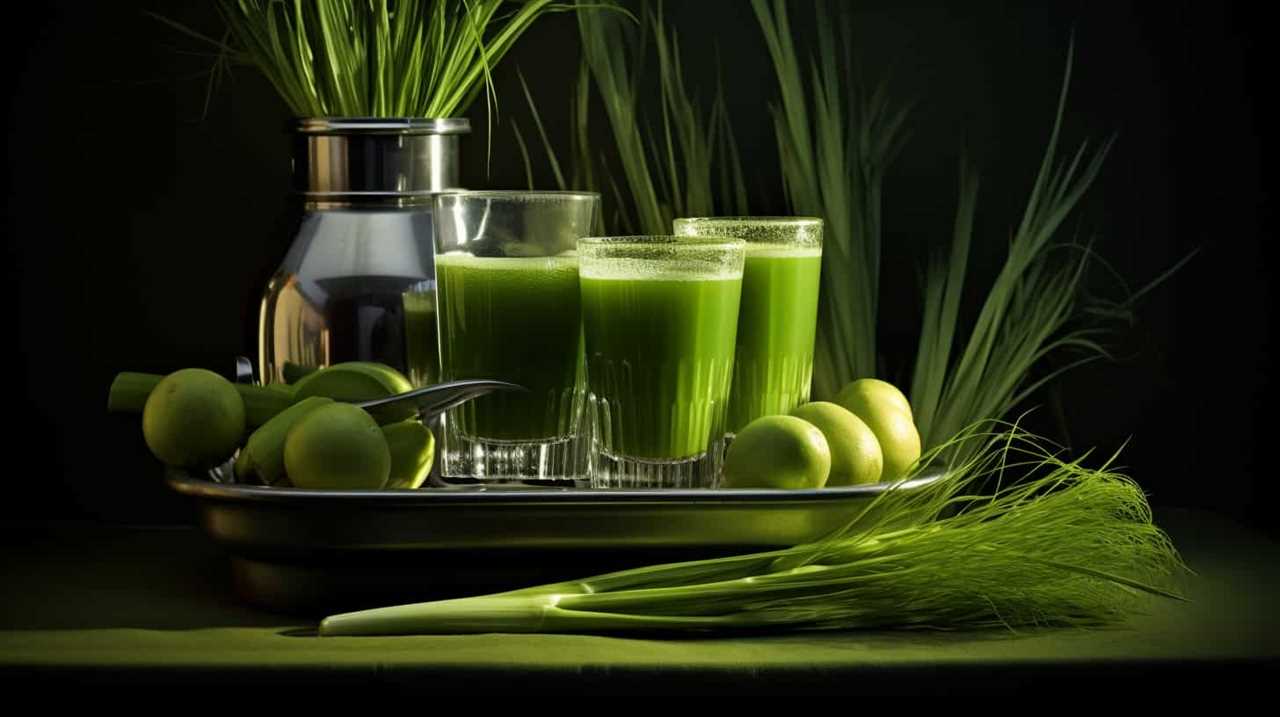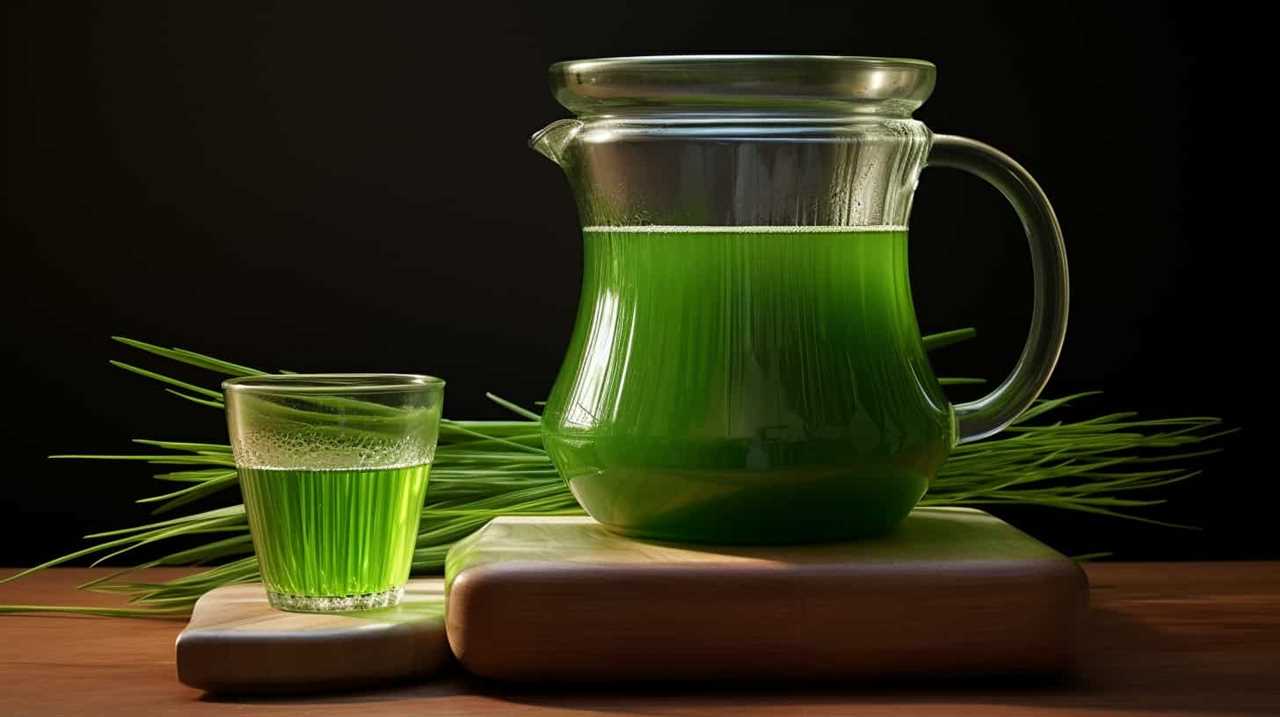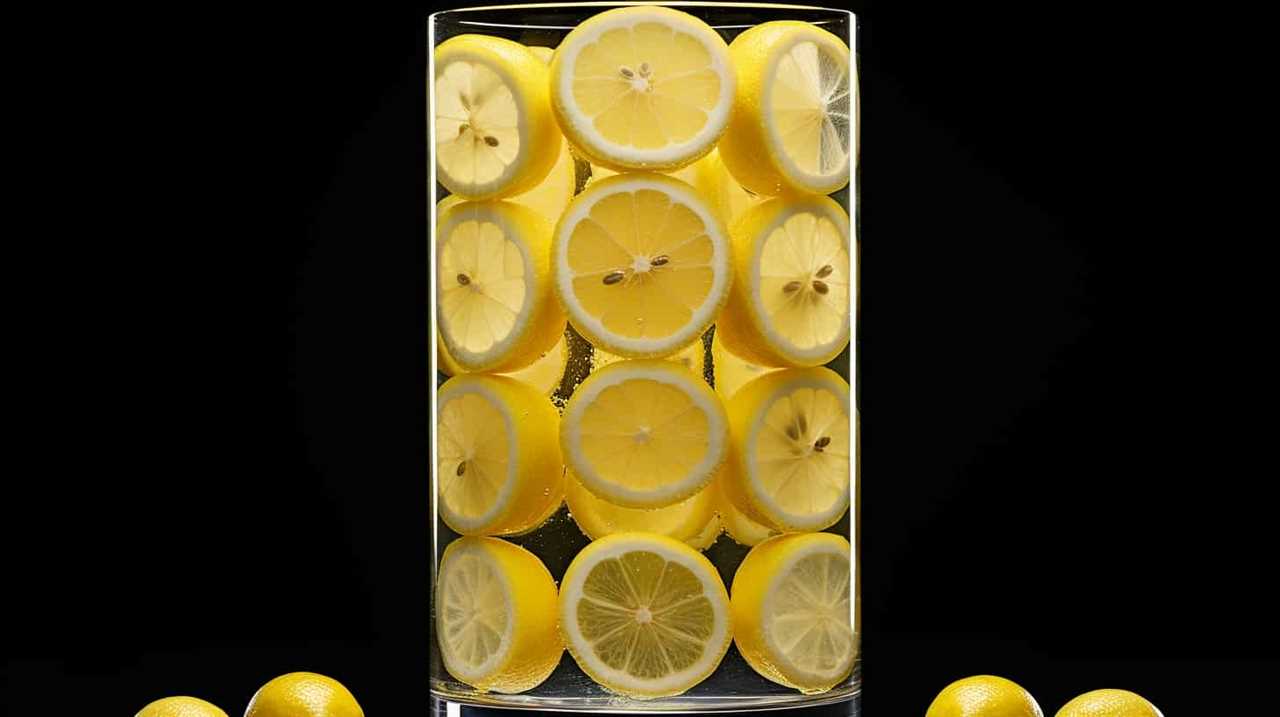Health Benefits of Juice
How Long Does Frozen Orange Juice Last


You might be wondering: how long can orange juice really stay frozen? Don’t worry! We’ve got all the information you need right here.
In this article, we’ll explore the factors that affect the shelf life of frozen orange juice, recommend proper storage conditions, and discuss signs of spoiled juice.
Plus, we’ll share tips on how to extend its shelf life and the best way to thaw it.
So sit back, relax, and let us serve you some juicy knowledge!

Key Takeaways
- Proper storage at 0°F (-18°C) or below extends the shelf life of frozen orange juice.
- Airtight containers or freezer bags prevent freezer burn and maintain taste and texture.
- Additives like ascorbic acid or Vitamin C can be used to inhibit oxidation and preserve the natural color and flavor of the juice.
- Thawing in the refrigerator overnight is the best practice for maintaining flavor and quality during the thawing process.
Factors Affecting the Shelf Life of Frozen Orange Juice
Our research has shown that temperature and packaging are two key factors affecting the shelf life of frozen orange juice. Proper storage conditions play a crucial role in maintaining the quality and longevity of the juice.
Temperature control is paramount, as fluctuations can lead to spoilage. It’s recommended to store frozen orange juice at a temperature of 0°F (-18°C) or below to prevent bacterial growth and maintain its freshness.
Additionally, the packaging of the juice should be airtight and resistant to moisture to prevent freezer burn and maintain the desired taste and texture.
Recommended Storage Conditions for Frozen Orange Juice
What are the recommended storage conditions for frozen orange juice?

When it comes to storing frozen orange juice, it’s important to use the right containers to maintain its quality. The recommended storage containers for frozen orange juice are airtight, moisture-resistant, and freezer-safe. This helps to prevent any exposure to air, moisture, and temperature fluctuations that can affect the taste and texture of the juice.
As for temperature, it’s crucial to store frozen orange juice at a constant temperature of 0°F (-18°C) or below. Freezing the juice at this temperature helps to preserve its flavor, color, and nutritional value. It’s also important to note that the quality of frozen orange juice may deteriorate if it’s exposed to higher temperatures for an extended period.
Now, let’s move on to the next section to learn about the signs of spoiled frozen orange juice.
Signs of Spoiled Frozen Orange Juice
We can identify signs of spoiled frozen orange juice by looking for changes in appearance, smell, and taste. When frozen orange juice goes bad, it may develop off flavors that are unpleasant and distinct from its usual taste. The juice may also undergo changes in color, becoming darker or showing signs of discoloration.

Additionally, spoiled frozen orange juice may have a rancid or sour smell instead of the fresh citrus aroma it usually has. It’s important to note that consuming spoiled frozen orange juice can lead to foodborne illnesses, so it’s best to discard it if any of these signs are present.
Always remember to check the appearance, smell, and taste before consuming frozen orange juice to ensure it’s still safe to drink.
Extending the Shelf Life of Frozen Orange Juice
To extend the shelf life of frozen orange juice, we can employ various methods such as proper storage and utilizing additives.
Proper storage is crucial in extending the freshness and preserving the flavor of frozen orange juice. It’s important to store the juice at a constant temperature of 0°F (-18°C) or below to prevent bacterial growth and maintain its quality. Additionally, keeping the juice in airtight containers or freezer bags can help prevent freezer burn and maintain its taste.

Utilizing additives such as ascorbic acid or Vitamin C can also help extend the shelf life by inhibiting oxidation and preserving the natural color and flavor of the juice.
By following these methods, we can ensure that our frozen orange juice remains fresh and flavorful for an extended period of time.
Now, let’s move on to the subsequent section about proper thawing techniques for frozen orange juice.
Proper Thawing Techniques for Frozen Orange Juice
Let’s begin by discussing the best way to thaw frozen orange juice for optimal taste and texture.

When it comes to thawing frozen orange juice, it’s important to follow a few best practices. The thawing time can vary depending on the size of the container and the temperature at which it’s stored.
One of the easiest and safest methods is to place the frozen orange juice in the refrigerator overnight. This slow thawing process ensures that the juice maintains its flavor and quality.
If you’re short on time, you can also use the defrost setting on your microwave, but be sure to monitor it closely to prevent overheating.
Frequently Asked Questions
Can Frozen Orange Juice Be Stored in the Refrigerator Instead of the Freezer?
Frozen orange juice can be stored in the refrigerator, but it is not recommended. The optimal temperature for orange juice storage is the freezer, where it can last for several months.

Is It Safe to Consume Frozen Orange Juice That Has Been Stored for More Than a Year?
Yes, it’s safe to consume frozen orange juice that has been stored for more than a year. However, it’s important to note that extended storage may affect the nutritional value. Here are some frozen orange juice storage tips.
Can Frozen Orange Juice Be Refrozen After It Has Been Thawed?
Yes, frozen orange juice can be refrozen after it has been thawed, but it is recommended to consume it immediately after thawing for the best taste and quality.
Can the Color of Frozen Orange Juice Change Over Time Without Indicating Spoilage?
Frozen orange juice can change color over time without indicating spoilage. To determine if it’s still safe to consume, check for any unusual odors, off flavors, or signs of mold.
How Long Can I Keep an Opened Container of Frozen Orange Juice in the Freezer Before It Goes Bad?
We can keep an opened container of frozen orange juice in the freezer for up to 3 months before it starts to go bad. It’s important to store it properly to ensure its maximum shelf life.

Conclusion
In conclusion, the shelf life of frozen orange juice can be affected by various factors such as storage conditions and signs of spoilage. By following recommended storage conditions and proper thawing techniques, the shelf life of frozen orange juice can be extended.
It’s important to be aware of signs of spoiled juice to ensure its freshness and quality. By taking these measures, you can enjoy a refreshing glass of orange juice that’s both delicious and safe to consume.
Susannah expertise lies in researching and compiling evidence-based content on juicing, nutrition, and overall health. She is committed to ensuring that The Juicery World offers accurate, up-to-date, and trustworthy information to empower readers to take control of their health. Susannah’s goal is to inspire individuals to embrace juicing as a way to nourish their bodies and live their best lives.
Health Benefits of Juice
Top 12 Fruits for Health-Boosting Juices

We have found the ultimate secret to enhancing your health and providing your body with the vital nutrients it desires: the top 12 fruits for creating healthy juices.
These powerhouse fruits, like apple, orange, pineapple, strawberry, blueberry, pomegranate, lemon, mango, and raspberry, are packed with vitamins, antioxidants, and fiber.
Say goodbye to sluggishness and hello to vibrant energy!
Get ready to tantalize your taste buds and nourish your body with these delicious and nutritious fruit juices.

Let’s embark on a journey to a healthier, more vibrant life together.
Key Takeaways
- Fruits like apple, orange, and pineapple are refreshing and versatile in recipes, providing an excellent source of vitamin C for immune-boosting properties. They are also rich in antioxidants that protect against chronic diseases and support digestion and a healthy gut. Additionally, they may reduce the risk of heart disease and support weight management.
- Strawberry, blueberries, and raspberry are packed with antioxidants, vitamin C, and fiber, making them great for immune health and digestion. They add sweetness and vibrant color to juice recipes. These fruits also protect the skin, promote a healthy complexion, and are low in calories while high in water content.
- Watermelon, kiwi, and grapefruit are hydrating and rich in vitamins and minerals for overall health. They support immune health, promote healthy digestion, prevent constipation, and provide antioxidant protection.
- Pomegranate and lemon are highly nutritious and antioxidant-rich. They protect cells from damage, reduce inflammation, and improve heart health. These fruits also aid digestion, support liver function, and promote detoxification.
- Mango is packed with essential nutrients, has a refreshing and sweet flavor, and is rich in vitamins A and C. It contains dietary fiber for digestion and boosts overall health.
Apple
We love adding apple to our health-boosting juices because of its refreshing taste and numerous health benefits.
Apples aren’t only delicious but also incredibly versatile in recipes. Whether you prefer a sweet or tangy juice, apples can enhance the flavor and provide a pleasant balance.
Additionally, apples are packed with essential nutrients that can contribute to your overall well-being. They’re a great source of dietary fiber, which aids in digestion and promotes a healthy gut.

Furthermore, apples are rich in antioxidants, such as flavonoids and vitamin C, which can help boost your immune system and protect against chronic diseases. Research has also suggested that consuming apples may reduce the risk of heart disease and support weight management.
Incorporating apples into your juices is a simple and effective way to enjoy their health benefits while adding a delightful twist to your recipes.
Orange
Continuing from the previous subtopic on apple, let’s now explore the health benefits of including orange in our health-boosting juices. Orange is a versatile fruit that can be used in a variety of recipes, making it a great addition to any juice blend.
Orange is packed with nutrients that can contribute to our overall health. It is an excellent source of vitamin C, which is known for its immune-boosting properties. Vitamin C also acts as an antioxidant, protecting our cells from damage caused by harmful free radicals. Additionally, oranges contain fiber, potassium, and folate, all of which are important for maintaining a healthy body.

To highlight the health benefits of oranges, take a look at the table below:
| Nutrient | Amount per 100g |
|---|---|
| Vitamin C | 53.2mg |
| Fiber | 2.4g |
| Potassium | 181mg |
| Folate | 30mcg |
| Calories | 43 |
Including orange in your health-boosting juices can provide a refreshing and nutritious addition. So why not embrace the versatility of oranges and enjoy the many health benefits they offer?
Pineapple
Let’s now delve into the health benefits of including pineapple in our health-boosting juices. Pineapple isn’t only a delicious tropical fruit but also provides numerous health benefits. Here are four reasons why you should consider adding pineapple to your juice recipes:
- Rich in vitamin C: Pineapple is packed with vitamin C, which can boost your immune system and protect against common illnesses.
- Anti-inflammatory properties: Bromelain, an enzyme found in pineapple, has been shown to reduce inflammation and alleviate symptoms of arthritis.
- Digestive aid: Pineapple contains bromelain, which aids in digestion by breaking down proteins and improving nutrient absorption.
- Hydration and detoxification: Pineapple juice is an excellent source of hydration and can help flush out toxins from your body.
Including pineapple in your health-boosting juices can provide you with a range of benefits, from immune support to digestive health. Try adding pineapple to your favorite juice recipes for a refreshing and nutritious twist.

Strawberry
Strawberries are packed with nutritional benefits, making them an excellent addition to health-boosting juices. They’re rich in antioxidants, vitamin C, and fiber, which support immune health and aid in digestion.
Additionally, strawberries are incredibly versatile and can be easily incorporated into a variety of juice recipes, adding a delicious sweetness and vibrant color.
Nutritional Benefits of Strawberries
We will now explore the nutritional benefits that strawberries bring to our health-boosting juices. Strawberries not only add a burst of flavor to our smoothies but also provide numerous benefits for our skin and overall health. Here are four key reasons why strawberries are a fantastic addition to our juice recipes:
- Rich in antioxidants: Strawberries are packed with antioxidants like vitamin C, which help protect our skin from damage caused by free radicals and promote a healthy complexion.
- High in fiber: With their high fiber content, strawberries can aid digestion and promote regularity, keeping our digestive system healthy and functioning properly.
- Low in calories: Strawberries are a great choice for those watching their calorie intake. They’re low in calories and high in water content, making them a refreshing and guilt-free addition to our juice recipes.
- Versatile in recipes: Strawberries can be used in a variety of juice recipes, from classic strawberry smoothies to creative combinations with other fruits and vegetables.
With their nutritional benefits and versatility, strawberries are a must-have ingredient for anyone looking to boost their health through delicious juices.

Versatility in Juice Recipes
As we delve into the versatility of incorporating strawberries into our juice recipes, we discover an array of creative and delicious combinations. Strawberries aren’t only packed with nutrients, but they also add a delightful flavor and vibrant color to any juice.
When it comes to juice recipes for kids, strawberries are a fantastic choice. Their natural sweetness appeals to children, making it easier to get them excited about drinking healthy juices. You can combine strawberries with other fruits like oranges and bananas to create refreshing and nutritious concoctions that kids will love.
Additionally, strawberries can also be used in cocktails for adults. Their tartness and bright flavor can enhance the taste of mixed drinks, adding a touch of sophistication and elegance.
Whether you’re making juice for kids or cocktails for adults, strawberries are a versatile and tasty ingredient to include.

Blueberry
Blueberries are packed with antioxidants and are a great addition to any health-boosting juice. Here are four reasons why you should consider adding blueberries to your next juice recipe:
- Nutritional Value: Blueberries are low in calories but high in nutrients. They contain vitamins C and K, as well as fiber, which can help promote a healthy digestive system.
- Antioxidant Power: Blueberries are rich in antioxidants, such as anthocyanins, which can help protect your body against oxidative stress and reduce inflammation.
- Heart Health: The antioxidants in blueberries have been shown to improve heart health by reducing the risk of heart disease and lowering blood pressure levels.
- Brain Function: Studies suggest that the antioxidants in blueberries may improve brain function and delay age-related cognitive decline.
By incorporating blueberries into your juice recipes, you can boost the nutritional value and enjoy the numerous health benefits they offer.
Now, let’s move on to our next fruit in line, watermelon.
Watermelon
Watermelon is a hydrating summer fruit that can be a great addition to your health-boosting juice. Not only is it delicious and refreshing, but it’s also packed with essential nutrients.

With high water content and vitamins like A and C, watermelon can help keep you hydrated and support your immune system.
Hydrating Summer Fruit
The watermelon is a hydrating summer fruit that provides numerous health benefits when juiced. Here are four reasons why you should include watermelon in your summer smoothies and refreshing beverages:
- Hydration: With its high water content of over 90%, watermelon helps keep you hydrated during the hot summer months.
- Electrolyte balance: Watermelon is rich in electrolytes like potassium, which helps maintain proper fluid balance in your body.
- Antioxidants: This juicy fruit is packed with antioxidants like lycopene, which can help protect your cells from damage caused by free radicals.
- Nutrient-rich: Watermelon is a good source of vitamins A and C, as well as minerals like magnesium and calcium, which are essential for overall health.
Nutrient-Packed Juice Option
One of our top choices for a nutrient-packed juice option is a delicious blend of fresh watermelon. Not only is watermelon incredibly hydrating, but it’s also low in calories and rich in essential vitamins and minerals. This juicy fruit is a great addition to a juice cleanse, as it helps to flush out toxins from the body and promote healthy digestion.
Watermelon is an excellent source of vitamin C, which is known for its immune system-boosting properties. It also contains lycopene, a powerful antioxidant that has been linked to a reduced risk of certain cancers and heart disease. Additionally, watermelon is packed with electrolytes, making it a refreshing choice for replenishing the body after exercise or on a hot summer day.

Transitioning to our next fruit, kiwi, we’ll explore another fantastic option for health-boosting juices.
Kiwi
When it comes to creating health-boosting juices, one fruit that we can’t overlook is the kiwi. This small, fuzzy fruit isn’t only delicious but also packed with essential nutrients that can benefit our overall health.
Here are four reasons why kiwi should be a staple in your juice recipes:
- Immune-Boosting Power: Kiwis are rich in vitamin C, which can strengthen our immune system and protect us from illnesses.
- Digestive Health: The fiber content in kiwis promotes healthy digestion and prevents constipation.
- Antioxidant Benefits: Kiwis contain antioxidants that help fight free radicals and reduce the risk of chronic diseases.
- Heart Health: The potassium and fiber in kiwis support cardiovascular health by maintaining healthy blood pressure levels.
Grapefruit
Grapefruit is known for its tangy citrus flavor, making it a popular choice for juicing. Not only does it add a refreshing twist to your juice, but it also packs a powerful punch of vitamin C, which is essential for a healthy immune system.

Additionally, grapefruit has been linked to weight loss benefits, as it’s low in calories and high in fiber, helping you feel fuller for longer and potentially aiding in weight management.
Tangy Citrus Flavor
We can’t resist adding a tangy citrus flavor to our health-boosting juices. Citrus fruits like grapefruit not only add a refreshing taste to your drinks but also provide numerous health benefits.
Here are four reasons why you should incorporate grapefruit into your juicing routine:
- Rich in vitamin C: Grapefruit is packed with vitamin C, which helps boost your immune system and protects against common illnesses.
- Weight loss aid: Grapefruit has been shown to aid in weight loss by reducing appetite and promoting fat burning.
- Heart-healthy: The antioxidants found in grapefruit can help lower cholesterol levels and reduce the risk of heart disease.
- Digestive health: Grapefruit contains dietary fiber, which aids in digestion and can help prevent constipation.
Try adding grapefruit to your favorite juice recipes for a zesty and tangy twist. Your taste buds and your health will thank you!

High in Vitamin C
One of the fruits in our top 12 list for health-boosting juices is a citrus fruit that’s high in vitamin C. Grapefruit, with its tangy taste, provides numerous nutritional benefits and is an excellent addition to your daily juice routine.
Vitamin C plays a crucial role in supporting a healthy immune system. It aids in the production of white blood cells, which are essential for fighting off infections and diseases. Additionally, vitamin C acts as an antioxidant, protecting our cells from damage caused by free radicals. Including grapefruit in your juices can help boost your overall immune function and keep you healthy.
Now, let’s move on to how grapefruit supports weight loss.
Supports Weight Loss
When it comes to weight loss, incorporating grapefruit into our juices has been proven to be effective. Here are four reasons why grapefruit supports weight loss:

- Low in calories: Grapefruit is a low-calorie fruit, making it a great choice for those looking to shed some pounds. It can help create a calorie deficit, which is essential for weight loss.
- High in fiber: This citrus fruit is rich in fiber, which aids in digestion and promotes feelings of fullness. By keeping us satisfied for longer periods, it can prevent overeating and cravings.
- Boosts metabolism: Grapefruit contains compounds that can increase metabolism, leading to more calories burned throughout the day. This can be beneficial for weight loss efforts.
- Hydrating and refreshing: Staying hydrated is essential for weight loss, and grapefruit is an excellent choice to quench our thirst while providing essential nutrients.
Incorporating grapefruit into our juicing routine can provide numerous weight loss benefits. So, let’s start juicing for weight loss and enjoy the delicious benefits of grapefruit.
Pomegranate
Pomegranate is a highly nutritious fruit that offers a myriad of health benefits. It is known as an antioxidant powerhouse, packed with compounds that help protect our cells from damage caused by harmful free radicals. These antioxidants have been linked to numerous health benefits, including reducing inflammation, improving heart health, and boosting our immune system.
One of the key benefits of pomegranate is its positive impact on heart health. Studies have shown that consuming pomegranate juice can help lower blood pressure, reduce cholesterol levels, and improve overall cardiovascular health. The fruit contains a unique compound called punicalagin, which has been found to have potent anti-inflammatory and antioxidant effects that can help prevent heart disease.
To better understand the health benefits of pomegranate, take a look at the table below:

| Health Benefits of Pomegranate | ||
|---|---|---|
| Antioxidant Powerhouse | Heart Health Benefits | Anti-inflammatory Properties |
| Boosts Immune System | Reduces Risk of Chronic Diseases |
Lemon
Lemons are another fruit that offer an array of health benefits, including their ability to enhance the flavor and health benefits of pomegranate juice. Here are four reasons why lemons are a versatile and healthy addition to your juice recipes:
- Rich in vitamin C: Lemons are packed with vitamin C, which supports immune function and helps protect against oxidative stress.
- Aid digestion: The citric acid in lemons can stimulate the production of digestive enzymes, aiding in digestion and promoting a healthy gut.
- Alkalizing properties: Despite their acidic taste, lemons have alkalizing effects on the body, helping to balance pH levels and reduce inflammation.
- Detoxification benefits: Lemons contain compounds that support liver function and help flush out toxins from the body, promoting overall detoxification.
With their versatility in recipes and numerous health benefits, lemons are a great addition to your juicing routine.
Mango
As we explore the benefits of incorporating mango into your health-boosting juices, it’s important to highlight its unique qualities.
Mangoes aren’t only delicious but also packed with essential nutrients that promote overall health. When juiced, mangoes provide a refreshing and sweet flavor that can be enjoyed on its own or combined with other fruits for a tasty blend. Mango juice recipes are versatile and can be customized to suit your taste preferences.

In terms of health benefits, mango juice is rich in vitamins A and C, which are essential for maintaining a strong immune system and healthy skin. Additionally, mangoes contain dietary fiber, which aids in digestion and promotes a feeling of fullness.
Including mango juice in your daily routine can provide a refreshing and nutritious way to boost your overall health.
Raspberry
Our favorite fruit for health-boosting juices is the raspberry’s sweet and tangy flavor. This vibrant red fruit not only adds a burst of flavor to your juice, but also provides numerous health benefits.
Here are four reasons why you should incorporate raspberries into your juicing routine:

- Antioxidant-rich: Raspberries are packed with antioxidants that help fight free radicals in the body, reducing the risk of chronic diseases.
- Immune-boosting: These berries are high in vitamin C, which strengthens the immune system and helps ward off infections.
- Digestive health: Raspberries are a great source of dietary fiber, promoting healthy digestion and preventing constipation.
- Skin health: The antioxidants in raspberries also benefit your skin, helping to reduce aging signs and promote a healthy complexion.
Try adding raspberries to your favorite juice recipes for a delicious and nutritious boost. From raspberry lemonade to berry smoothies, the possibilities are endless when it comes to incorporating this versatile fruit into your daily routine.
Frequently Asked Questions
How Many Calories Are There in a Glass of Orange Juice?
There are approximately 112 calories in a glass of orange juice. It is also rich in essential nutrients like vitamin C, potassium, and folate, making it a nutritious choice for a health-boosting juice.
Can Pineapple Juice Help With Digestion?
Pineapple juice indeed aids digestion by promoting the production of enzymes. Its benefits for gut health are well-documented. So, yes, pineapple juice can help with digestion and improve overall gut health.
Are Strawberries High in Vitamin C?
Yes, strawberries are high in vitamin C. They are great for boosting the immune system and promoting skin health. Incorporating strawberries into your diet can provide numerous health benefits.

Is It Safe to Consume Watermelon Juice During Pregnancy?
Watermelon juice during pregnancy? Absolutely! It’s a refreshing and hydrating choice. Plus, it’s low in calories and packed with vitamins A and C. Just be mindful of portion sizes and consult your doctor if you have gestational diabetes concerns.
What Are the Health Benefits of Drinking Pomegranate Juice?
Drinking pomegranate juice has numerous health benefits. It can improve heart health by reducing cholesterol and blood pressure. Additionally, pomegranate juice is rich in antioxidants, which help protect cells from damage and boost overall health.
Conclusion
In conclusion, incorporating these top 12 fruits into your daily juice routine can provide a boost to your overall health. With their abundance of vitamins, minerals, and antioxidants, these fruits offer a delicious and nutritious way to support your well-being.
So why not grab your juicer and start enjoying the benefits of these health-boosting juices today? Can you taste the difference?

Susannah expertise lies in researching and compiling evidence-based content on juicing, nutrition, and overall health. She is committed to ensuring that The Juicery World offers accurate, up-to-date, and trustworthy information to empower readers to take control of their health. Susannah’s goal is to inspire individuals to embrace juicing as a way to nourish their bodies and live their best lives.
Health Benefits of Juice
Shed Pounds With Vegetable Juice: Health Perks Revealed

Are you prepared to lose those additional pounds and improve your health by incorporating vegetable juice into your diet? We have some exciting news to share with you!
In this article, we’re going to reveal the secret health perks of incorporating vegetable juice into your daily routine. From boosting your metabolism to controlling your appetite, vegetable juice is a game-changer on your weight loss journey.
So sit back, grab a glass of refreshing veggie goodness, and get ready to embark on a journey towards a healthier, slimmer you!
Key Takeaways
- Vegetable juice boosts metabolism and aids in burning calories, which can contribute to weight loss.
- Vegetable juice suppresses appetite and keeps you feeling full due to its high fiber content, reducing calorie intake and cravings for unhealthy snacks.
- Vegetable juice provides essential vitamins, minerals, and antioxidants, ensuring a diverse range of nutrients for overall health and well-being.
- Vegetable juice supports weight loss by reducing cravings for high-calorie foods, replacing high-calorie beverages, and serving as a visual reminder for healthier food choices.
Boosts Metabolism
Boosting metabolism is a key factor in achieving weight loss goals. Vegetable juice can help us achieve that.

Vegetable juices, such as carrot, beet, and celery juice, are packed with essential nutrients that not only provide numerous health benefits but also aid in weight loss.
Drinking vegetable juice regularly boosts energy levels, helping us stay active and burn more calories throughout the day.
Additionally, the nutrients in vegetable juice support our body’s natural metabolic processes, improving weight loss. For example, the high fiber content in vegetables helps regulate blood sugar levels, preventing spikes that can lead to weight gain.
Moreover, the antioxidants present in vegetable juice combat inflammation, which has been linked to obesity.

As we transition to the subsequent section about ‘controls appetite’, it’s important to note that vegetable juice can help us feel fuller for longer, ultimately reducing our calorie intake.
Controls Appetite
To continue our exploration of the health benefits of vegetable juice, let us now delve into how it helps us control our appetite. Vegetable juice has been found to be effective in appetite suppression, making it a valuable tool for weight management. The key lies in the high fiber content of vegetables, which helps us feel fuller for longer periods of time. Additionally, the low calorie and high nutrient content of vegetable juice allows us to satisfy our cravings without consuming excessive calories.
| Benefits of Vegetable Juice for Appetite Control | How it helps us |
|---|---|
| Provides high fiber content | Keeps us feeling full for longer |
| Low in calories, high in nutrients | Satisfies cravings without excessive calories |
Increases Nutrient Intake
One significant benefit of incorporating vegetable juice into our diet is the increased intake of essential nutrients. Vegetable juices are packed with vitamins, minerals, and antioxidants that are essential for our overall health and well-being. By drinking vegetable juice, we can easily consume a wide variety of vegetables in one serving, which ensures that we’re getting a diverse range of nutrients.
These nutrients play a crucial role in boosting our energy levels and promoting weight loss. For example, leafy greens like spinach and kale are rich in iron, which helps transport oxygen throughout our body and increases energy. Additionally, vegetables like carrots and bell peppers are high in fiber, which promotes feelings of fullness and aids in weight loss.

Reduces Caloric Intake
Drinking vegetable juice can help us reduce our caloric intake, which is beneficial for weight loss. Here’s how it works:
- Reduces cravings: Vegetable juice is packed with nutrients and fiber, which can help curb cravings for unhealthy, calorie-dense foods. By satisfying our hunger with nutrient-rich juice, we’re less likely to reach for sugary snacks or high-fat meals.
- Promotes weight loss: By replacing high-calorie beverages like soda or sugary juices with vegetable juice, we can significantly reduce our daily calorie intake. Vegetable juice is low in calories and can make us feel full, helping us consume fewer calories overall.
- Creates a visual reminder: Having a glass of vibrant, colorful vegetable juice in front of us serves as a visual reminder of our commitment to healthy eating. This imagery can motivate us to make better food choices throughout the day.
Reducing caloric intake is just one way that drinking vegetable juice can support weight loss. Now, let’s explore how it enhances digestion.
Enhances Digestion
Our digestion is further enhanced by the consumption of vegetable juice. Not only does it provide essential nutrients, but it also improves gut health, aiding in weight loss.
Vegetable juice is rich in fiber, which promotes regular bowel movements and prevents constipation. It also contains enzymes that help break down food, making it easier for our bodies to absorb nutrients. Additionally, the high water content in vegetable juice helps to hydrate the digestive system and keep things moving smoothly.

The antioxidants found in vegetables also play a role in improving digestion by reducing inflammation and supporting a healthy gut microbiome.
Incorporating vegetable juice into your diet can be a simple and effective way to enhance digestion and support your weight loss goals.
Frequently Asked Questions
Can Vegetable Juice Alone Help Me Shed Pounds, or Do I Need to Incorporate Other Dietary Changes?
Incorporating exercise and making other dietary changes along with vegetable juice can help us shed pounds. While vegetable juice offers health benefits, it is important to have a well-rounded approach to weight loss.
Is It Better to Consume Vegetable Juice in the Morning or Throughout the Day for Weight Loss?
When is the best time to drink vegetable juice for weight loss? Morning or evening? Juicing or blending? Well, research shows that consuming vegetable juice in the morning can kickstart your metabolism and keep you feeling full throughout the day.

Are There Specific Vegetables That Are More Effective for Weight Loss When Juiced?
When it comes to shedding pounds, some vegetables may be more effective than others when juiced. Incorporating vegetables like spinach, kale, and cucumber into your juice can provide essential nutrients and aid in weight loss.
Can I Replace Meals With Vegetable Juice for Faster Weight Loss Results?
Replacing meals with vegetable juice can lead to faster weight loss results, but there are pros and cons to consider. While it can be nutrient-rich and low in calories, it may lack protein and fiber, leading to hunger and potential nutrient deficiencies.
How Long Does It Typically Take to See Weight Loss Results From Drinking Vegetable Juice Regularly?
It typically takes a few weeks to see weight loss results from regularly drinking vegetable juice. The benefits of vegetable juice include increased nutrient intake, reduced calorie consumption, and improved digestion, leading to gradual and sustainable weight loss.
Conclusion
In conclusion, incorporating vegetable juice into your diet can be a practical and effective way to shed pounds.

With its ability to boost metabolism, control appetite, increase nutrient intake, reduce caloric intake, and enhance digestion, vegetable juice offers a multitude of health perks.
So why not give it a try? Start sipping on delicious and nutritious vegetable juices today and witness the positive impact it can have on your weight loss journey.
Your body will thank you!
Susannah expertise lies in researching and compiling evidence-based content on juicing, nutrition, and overall health. She is committed to ensuring that The Juicery World offers accurate, up-to-date, and trustworthy information to empower readers to take control of their health. Susannah’s goal is to inspire individuals to embrace juicing as a way to nourish their bodies and live their best lives.
Health Benefits of Juice
Organic Green Juice: Key to Nutrient-Rich Wellness

Ready to revolutionize your journey to better health? Organic green juice is the key to achieving optimal wellness with its rich nutrients and benefits.
Packed with vitamins, minerals, and antioxidants, this vibrant concoction is a powerhouse that can boost your immune system, detoxify your body, enhance digestion, provide a natural energy boost, and even support healthy weight management.
Join us as we embark on a journey to nourish our bodies and serve ourselves the gift of vibrant health.
Key Takeaways
- Organic green juice boosts the immune system and supports detoxification.
- It enhances digestion and gut health, promoting nutrient absorption and overall well-being.
- Drinking organic green juice provides a natural energy boost and revitalizes the body.
- Incorporating organic green juice into a healthy weight management plan can support weight loss and maintenance.
Boosts Immune System
To understand how organic green juice boosts the immune system, we need to explore its powerful combination of nutrients and antioxidants.

Organic green juice is packed with essential vitamins and minerals that play a crucial role in supporting immune health. Ingredients like kale, spinach, and broccoli are rich in vitamin C, which helps boost white blood cell production and enhance immune function.
Additionally, the antioxidants found in organic green juice, such as vitamins A and E, help protect cells from damage and reduce inflammation, further strengthening the immune system.
Detoxifies the Body
An organic green juice detoxifies the body by flushing out toxins and promoting optimal health. It is packed with nutrients that support the body’s natural detoxification processes, helping to cleanse toxins from the liver, kidneys, and other organs. This cleansing effect can lead to improved skin complexion, as toxins are eliminated from the body, leaving the skin looking clearer and more vibrant.
To further illustrate the detoxifying benefits of organic green juice, consider the following table:

| Detoxification Benefits of Organic Green Juice | Evidence |
|---|---|
| Cleanses toxins from the body | Studies have shown that certain compounds found in green vegetables can support the body’s detoxification pathways and aid in the elimination of toxins. |
| Improves skin complexion | The high levels of antioxidants in green vegetables can help protect the skin from damage and promote a healthy, glowing complexion. |
| Promotes overall health and wellness | Detoxifying the body can have numerous benefits, including increased energy levels, improved digestion, and a strengthened immune system. |
Enhances Digestion and Gut Health
Our next benefit of organic green juice is how it enhances digestion and promotes gut health. Drinking organic green juice can improve nutrient absorption and promote overall well-being.
The high fiber content in green vegetables helps to regulate bowel movements and prevent constipation. It also supports the growth of healthy gut bacteria, which aids in digestion and strengthens the immune system.
Additionally, the enzymes present in green vegetables help break down food and facilitate better nutrient absorption. This means that your body can extract more nutrients from the food you eat, leading to improved overall health.
Provides a Natural Energy Boost
Drinking organic green juice provides us with a natural energy boost, revitalizing our bodies and enhancing our overall well-being. Here are three reasons why organic green juice is a great source of natural energy:

- Natural ingredients: Organic green juices are made from fresh, natural ingredients like kale, spinach, and cucumber. These ingredients are packed with essential nutrients, including vitamins, minerals, and antioxidants, which help to fuel our bodies and provide sustained energy throughout the day.
- Sustainable farming: Organic green juice is often made from ingredients that are grown using sustainable farming practices. This means that the fruits and vegetables used in the juice are grown without the use of harmful pesticides or synthetic fertilizers. By choosing organic green juice, we aren’t only benefiting our own health but also supporting environmentally friendly farming methods.
- Nutrient density: Organic green juice is a concentrated source of nutrients. It provides a quick and easy way to consume a variety of vitamins and minerals that are essential for energy production. By drinking organic green juice, we’re giving our bodies the fuel they need to stay energized and perform at their best.
Supports Healthy Weight Management
Continuing the discussion on the benefits of organic green juice, incorporating it into a healthy weight management plan can be highly advantageous.
Organic green juice offers weight loss benefits by providing essential nutrients while being low in calories. It’s rich in vitamins, minerals, and antioxidants that support overall health and well-being.
The high fiber content in green juice helps to promote satiety, reducing the temptation to overeat. Additionally, green juice can support metabolism by providing the body with important enzymes that aid in digestion and nutrient absorption. This can help to optimize the body’s ability to burn calories and maintain a healthy weight.
Frequently Asked Questions
How Do I Choose the Best Organic Green Juice for Maximum Nutrient Content?
When it comes to choosing the best organic green juice for maximum nutrient content, we have some tips. Look for reputable brands that prioritize organic ingredients and cold-pressed extraction methods.

Can Organic Green Juice Help With Skin Health and Appearance?
Organic green juice can indeed help improve skin health and appearance. It is packed with nutrients that promote overall well-being, including hair health. Incorporating it into your diet can have a positive impact on your overall wellness.
Is It Safe to Consume Organic Green Juice Every Day?
Daily consumption of organic green juice is generally safe, but it’s important to be mindful of potential health risks. It’s always best to consult with a healthcare professional to ensure it aligns with your specific needs and goals.
Can Organic Green Juice Replace the Need for Taking Vitamin Supplements?
Organic green juice and vitamin supplements serve different purposes in a balanced diet. While green juice provides essential nutrients, it may not fully replace the need for supplements. It’s important to consult with a healthcare professional for personalized recommendations.
What Are Some Common Misconceptions About Organic Green Juice and Its Benefits?
Some common misconceptions about organic green juice and its benefits include its inability to replace vitamin supplements and its limited role in weight loss. However, research shows that it can be an effective way to boost nutrient intake and support overall wellness.

Conclusion
So there you have it, folks! Organic green juice, the magical elixir that will solve all your problems and make your life perfect.
Just kidding! While it does offer some health benefits, let’s not get carried away. It’s important to remember that no single food or drink can guarantee wellness.
A balanced diet, exercise, and overall healthy lifestyle are what truly contribute to our well-being. So enjoy your green juice, but don’t expect it to be a miracle cure.
Susannah expertise lies in researching and compiling evidence-based content on juicing, nutrition, and overall health. She is committed to ensuring that The Juicery World offers accurate, up-to-date, and trustworthy information to empower readers to take control of their health. Susannah’s goal is to inspire individuals to embrace juicing as a way to nourish their bodies and live their best lives.
-

 Juice Tips and Tricks3 weeks ago
Juice Tips and Tricks3 weeks agoHow To Make Homemade Pickle Juice
-

 Health Benefits of Juice1 month ago
Health Benefits of Juice1 month agoHow Much Bottled Lemon Juice Equals 1 Lemon
-

 Juice Tips and Tricks1 week ago
Juice Tips and Tricks1 week agoHow Much Lemon Juice Is Equal To Half A Lemon
-

 Juice Tips and Tricks2 weeks ago
Juice Tips and Tricks2 weeks agoHow Much Lemon Juice Concentrate Equals One Lemon
-

 Popular Juice Brands3 months ago
Popular Juice Brands3 months ago10 Top-Rated Organic Juice Brands to Try
-

 Popular Juice Brands3 months ago
Popular Juice Brands3 months ago9 Best No-Sugar-Added Popular Juice Brands
-

 Juice Tips and Tricks2 days ago
Juice Tips and Tricks2 days agoHow Long Can You Drink Orange Juice After The Expiration Date
-

 Juice Tips and Tricks1 month ago
Juice Tips and Tricks1 month agoHow Long Does Lemon Juice Last After Expiration Date










